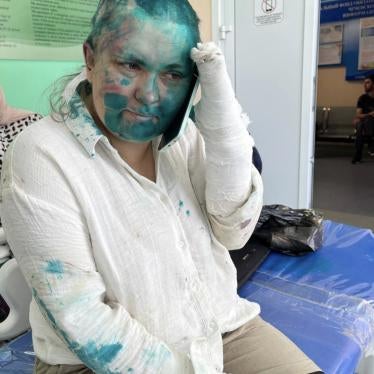We are writing to urge you to use the February 13 EU-Russia Troika meeting to send a strong message to Minister Lavrov and other Russian government officials about Russia’s obligation to comply fully with European Court of Human Rights judgments, including those on Chechnya.
In a growing number of judgments—24 to date, with hundreds of additional cases pending—the European Court of Human Rights has found Russia responsible for serious human rights abuses in Chechnya. The court determined that Russia was responsible for extrajudicial executions, torture, and enforced disappearances and confirmed the systematic nature of abuses in Chechnya. In every case adjudicated to date, the court found that Russia failed to conduct an effective investigation into the alleged abuses.
It has been just over three years since the Court issued its first ruling on Chechnya. In these three years, while Russia has complied with its obligation to pay compensation in individual cases, it resists taking effective action to ensure an end to continuing abuses and to impunity for crimes. Although the number of enforced disappearances in Chechnya has decreased in recent years, Human Rights Watch continues to document grave abuses in Chechnya and other parts of the North Caucasus. Those abuses include, but are not limited to, extrajudicial executions, torture, enforced disappearances, abductions, and unlawful detentions. Prosecutions for these crimes remain extremely rare.
Absent sustained political pressure, Russia is unlikely to take the necessary steps to end human rights abuses in Chechnya and ensure accountability for these crimes. It is therefore crucial that the EU as a whole and its individual members make full Russian compliance with these judgments an integral part of their dealings with Moscow.
We believe that the European Court judgments provide the EU with a unique platform for pressing Russia to end ongoing abuses in Chechnya and ensure accountability for past violations:
- The judgments give an objective assessment of Russia’s responsibility for the abuses, and demonstrate how Russia’s failure to hold perpetrators accountable has allowed abuses to persist. While the judgments issued to date concern abuses dating back to 2000-2002, they concern systemic problems that the Russian government has failed to address, which have resulted in the perpetuation of abuses in Chechnya and in the broader Northern Caucasus.
- The judgments impose an obligation on Russia to take specific steps to implement them. This duty to implement means that Russia must both rectify abuses in individual cases by undertaking effective investigations and compensating the victims and their relatives, and, equally as important, by remedying the underlying, systemic problems that led to the abuses in order to prevent similar violations in the future.
- The judgments create a framework for formal EU engagement with Russia on its implementation of judgments. EU member states, as members of the Council of Europe, form part of the Council of Europe’s Committee of Ministers, the institution formally in charge of supervising Russia’s compliance with European Court judgments. Through the quarterly Committee of Ministers Human Rights meetings, EU member states have an important opportunity to press Russian representatives regarding specific steps Russia is taking in order to fulfill its obligations to implement European Court judgments.
But beyond this formal mechanism, EU member states and the EU as a whole also have a responsibility to make Russia’s full compliance with these judgments a high priority in all dialogues with Moscow not only in Strasbourg, but at every opportunity, including at the highest levels.
Prioritizing Russia’s implementation of European Court judgments on cases from Chechnya is crucial to ensure justice for individual victims, to prevent further abuses in Chechnya, and to guarantee the integrity and efficacy of the European Court, which is the leading mechanism in Europe for ensuring that states uphold human rights commitments. In particular, as a key component of preventing abuses from continuing to take place, Russia must demonstrate a commitment to end impunity for abuses in Chechnya. As a concrete first step, the EU and its member states should press Russia to immediately investigate and prosecute those responsible for crimes in Chechnya. The investigations should in particular include investigations into the role and responsibility, including command responsibility, of Major-General Jakov Nedobitko and Major-General Vladimir Shamanov, whom the European Court implicated in the violations cited in the Isayeva v Russia case and Colonel-General Alexander Baranov, whom the court determined ordered the execution of Khadzhi-Murat Yandiev in the Bazorkina v Russia case.
We hope you will seize the significant opportunity provided by the European Court judgments on Chechnya to prevail on the Russian government to once and for all stop widespread human rights abuses in Chechnya and hold perpetrators accountable. For the thousands of victims of human rights abuses in Chechnya, these judgments represent their best hope to ever see justice and an end to abuses in Chechnya.
In the words of Arbi Chitaev, a victim of torture at the hands of Russian federal servicemen who, together with his brother, Adam, won their case before the European Court just one year ago, “I did not believe that there was justice possible for me anywhere in the world. When they told me that we had won our case before the European Court, I was able to believe again that justice was possible. I think that this decision can help other people in Chechnya also know that there is justice. They can go through the court and used civilized methods of justice.”
Thank you for your attention to this important matter.
Sincerely,
Holly Cartner
Executive Director
Europe and Central Asia Division
Lotte Leicht
EU Director







